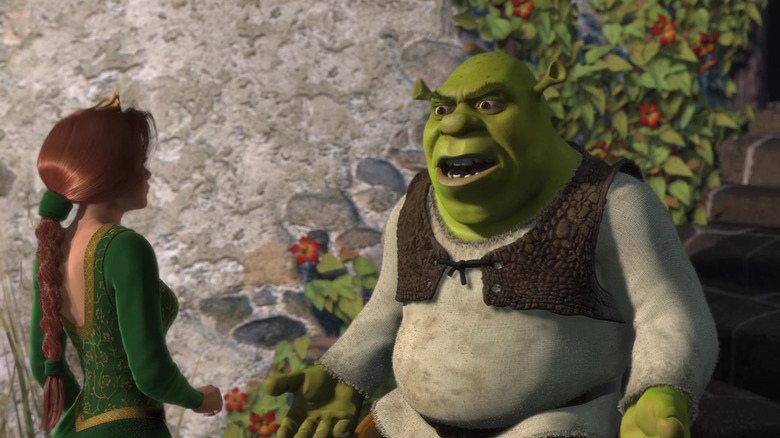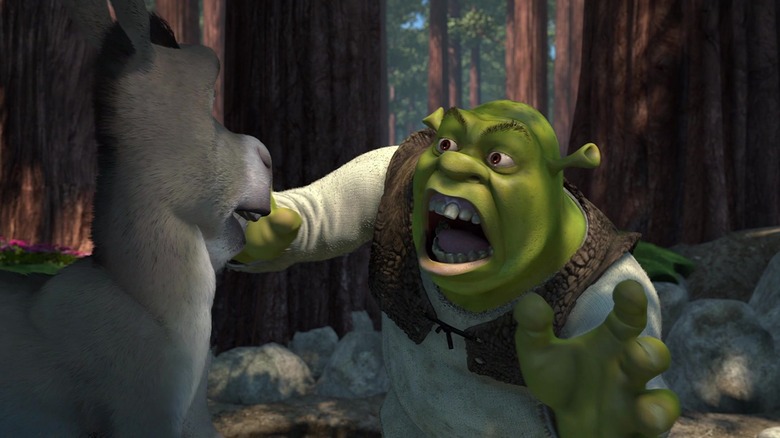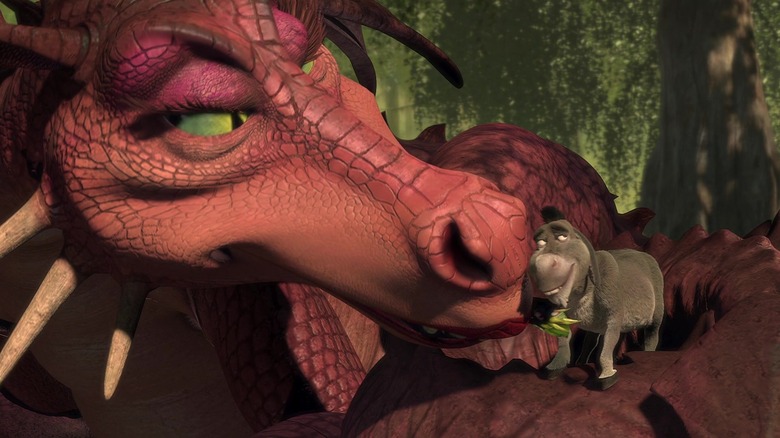Why Russia Is Trying To Ban The Shrek Franchise
Yes, this is real.
According to a recent report in the Moscow Times, Russian lawmakers have targeted Shrek, the ogre, for potential censorship after he was deemed to be having a "destructive impact" on Russian children. Shrek was a monstrous character first introduced in the 1990 picture book "Shrek!" by William Steig. The book was adapted into a satirical feature film in 2001, altering Steig's story into a pointed anti-Disney story about fairy tale characters who become victims of forced relocation. Shrek, voiced by Mike Myers, was the antihero forced to perform heroic tasks in order to get other fairy tale creatures out of his yard. "Shrek" was an enormous success, and spawned a massive media franchise that remains active to this day; "Shrek 5" is due in theaters in 2026.
One can watch a video of higher-ups in the Russian government having a brainstorming session/slide show about the influence of world media on the Russian population, and hear their sharp criticism thereof. Shrek was just one of several characters they felt could be a bad influence. "They don't seem bad," said State Duma deputy Yana Lantratova in on one of their specialized slides, "but they have both physical and personality flaws. [...] Gradually, with the infiltration of Western culture, characters began to appear who embodied negative traits but were elevated to the status of positive characters. The image of the purely positive character began to fade."
So it doesn't matter that Shrek learns to be a more noble character by the end of his movie, or that he transforms from a vicious misanthrope into a romantic lead. The fact that he has any negative traits at all was enough to make Russia suspicious. Yes, Russia thinks that Shrek is a bad role model. The same slideshow also pointed to The Grinch and to Mike Wazowski from "Monsters, Inc." as possessing similar negative qualities.
But that's not the only reason Russia is going after American kiddie entertainment. Naturally, it's a lot more insidious.
Russia sees American kiddie movies as propaganda
The Moscow Times report quoted Sergei Mironov, one of the nation's minority political party leaders, as accusing America and the Western World in general as waging what he called a "hybrid war" against Russia. He said that other countries were deliberately trying to influence Russian children to accept anti-Russian attitudes. "Unfortunately," he said, "[certain countries] are very actively engaged in indoctrinating our children." Mironov belongs to — and used to be the leader of — a group called A Just Russia, a political enclave that is said to support the policies of Russia's president, Vladimir Putin (for more context on Putin, check out the Oscar-winning documentary, "Navalny").
According to the report, "a legal gray area is preventing Russian authorities from blocking Western content made for children," so "Shrek" is not actually banned in that country at the moment. Attacking Shrek, though, does seem to be a way to fall in line with Putin's calls to push for more "traditional" and "pro-family" policies, two phrases that are frequently associated with oppression and censorship. These pushes, according to a report in Metro UK, come at the same time as Putin's campaign to encourage Russian women to have more children. Any kind of media that is seen to encourage women to not have children could reportedly be met with hefty fines of up to $46,000 (if the offender is a major entertainment corporation). But even individuals could be slapped with a fine.
(Notably, the Russian government has banned queer films and TV shows because the country has deemed the "international LGBT movement" to be an "extremist organization.")
What are Shrek's values?
But what is Russia actually going after with "Shrek?" Sure, they mentioned that he's not an ideal character, and Shrek is certainly misanthropic, but does he espouse unhealthy values? The first "Shrek," with its controversial Scottish legacy, functions primarily as a sendup of Disney's overwhelming cultural stranglehold on certain European fairy tales. This is a film wherein a princess sings to a bird (just as Disney's versions of Snow White, Cinderella, or Sleeping Beauty did), but she sings so high that the bird explodes. The Princess (played by Cameron Diaz) expects to be treated like Snow White or Sleeping Beauty, but is miffed to find that her rescuer is a bulky, green-skinned ogre who doesn't give a damn about being a hero. It's a comedic antidote to Disney's po-faced, bland romances starring boring-ass Princes Charming.
Shrek himself, while grumpy and angry, eventually softens, falling in love with Fiona. He struggles with his self-image, feeling that woman can't fall in love with ugly ogres. It will eventually be revealed that Fiona is under a curse and admits that she, too, has fallen in love with him, eventually taking the form of an ogre herself. The story is about romance, self-acceptance, and unconventional couples that don't fit into Disney's traditional mold. Donkey (Eddie Murpohy) falls in love with a Dragon. Shrek is, ultimately, kind of noble.
It's possible that the film's selfish, power-hungry villain, Lord Farquaad (John Lithgow), is really the target of Russia's bans. Farquaad is depicted as a cruel dictator who bans magical creatures from his kingdom, and who uses force and manipulation to get what he wants. He is insecure about his height, whiny, mean, and pathetic. He only wants power. He possesses no good qualities. And yet, he is the man in charge, calling the shots, and enacting bans. Perhaps real-life men in charge, keen on deporting people from their countries, see too much of themselves in Farquaad.


